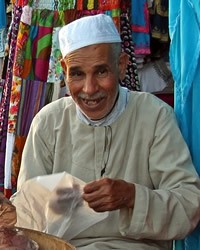Arab, Moroccan in Sudan

Photo Source:
Monica Volpin - Pixabay
|
Send Joshua Project a map of this people group.
|
| People Name: | Arab, Moroccan |
| Country: | Sudan |
| 10/40 Window: | Yes |
| Population: | 314,000 |
| World Population: | 31,513,800 |
| Primary Language: | Arabic, Moroccan |
| Primary Religion: | Islam |
| Christian Adherents: | 0.00 % |
| Evangelicals: | 0.00 % |
| Scripture: | New Testament |
| Ministry Resources: | Yes |
| Jesus Film: | Yes |
| Audio Recordings: | Yes |
| People Cluster: | Arab, Maghreb |
| Affinity Bloc: | Arab World |
| Progress Level: |
|
Introduction / History
Arabs represent the largest, most diverse, and most politically influential Muslim ethnic grouping in the world. While there are several characteristics that determine if a person is a true Arab, one trait is always evident: a proud sense of being an Arab. The early Islamic period was a time when "Arab identity" meant that all Arabs had descended from a common male ancestor. Thus, being an Arab brought recognition, honor and certain privileges. Their physical, geographical and religious aspects all vary greatly. However, the ability to speak Arabic (or an Arabic dialect) and identification with the Arabian cultural heritage are, perhaps, the two most essential elements. Though political unity is still a dream among Arabs, the Arabic language remains the greatest common tie. Attempting to preserve their original language, Arabs have maintained two basic forms of Arabic, though each Arab country has their own dialect. The first is "classical Arabic," the religious and literary language spoken and written uniformly throughout the Arab world. The second is "colloquial Arabic," the informal spoken language which varies by dialect from region to region. Both forms are used by educated Arabs. Arabs are the majority people in many countries in the Arabian Peninsula, the Maghreb, and all of North Africa including Morocco and Algeria. With rapid fire speed, the Arabs conquered this region and spread Islam throughout, though there is still a remnant of traditional Christians among Arabs. In more recent years, the Arabs have moved further south into countries like Sudan.
What Are Their Lives Like?
Though the Moroccan Arab diaspora is spread far and wide, there is a large group of them in Sudan, far to the east of Morocco. Moroccan Arabs are trying to preserve cultural traditions such as the naming of children. It is customary for an Arab child's name to reflect the three dominant elements of Arab life: kin, home, and religion. Thus, a boy might have a name such as "Mohammad ibn Ibrahim al Hamza." "Mohammad" represents his religious name. "Ibn Ibrahim" is his father's name. "Al Hamza" means that he is from the village of Hamza. Girls are given similar names, which they keep even after marriage. This reflects the Muslim Arab tradition that even though women are subservient to men, they retain their identities, separate legal rights, and family ties. Circumcision for boys continues to be a universal practice among Arabs. This ritual is performed around the seventh year and they celebrate it as the formal initiation of the boy into the religious community.
What Are Their Beliefs?
It was early in the seventh century that Mohammed first preached the tenets of Islam to the Arabs. His successors quickly spread the word of Allah far and wide. Wherever Arabs went, they left elements of their Arab culture, including their Islamic religion. Thus, Islam is an important part of Moroccan Arab identity. Arabic speaking Moroccans in Sudan believe that Allah, spoke through his prophet, Mohammed, and taught mankind how to live a righteous life through the Koran and the Hadith. To live a righteous life, they must utter the Shahada (a statement of faith), pray five times each day facing Mecca, fast from sunup to sundown during the Month of Ramadan, give alms to the poor, and make a pilgrimage to Mecca. Muslims are prohibited from drinking alcohol, eating pork, gambling, stealing, slandering, and making idols. They gather for corporate prayer on Friday afternoons at a mosque, their place of worship.
What Are Their Needs?
Since Islam is ingrained in the identity of so many Moroccan Arabs, we need to pray that they put their identity in Christ, the sure foundation.
Prayer Points
Pray that God will raise up faithful intercessors who will stand in the gap for Moroccan Arabs in Sudan. Pray that the softening of their traditional culture will soften their hearts so they will hunger for the truth and eagerly accept it when they hear it. Pray for a church planting movement among Moroccan Arabic speaking people in Sudan that will show others the transforming power of the gospel in their lives. Ask the Lord to raise up strong local churches and discipleship movements among Diaspora Arabs in Sudan.